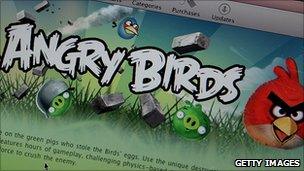Are patents good for you?
- Published
- comments

The Angry Birds game has had more than 300 million downloads
Patents are supposed to be good for innovation, protecting an inventor from having their ideas ripped off by unscrupulous imitators.
The current battle between a number of software developers and an American firm called Lodsys, external seems to show patents can have a chilling effect on entrepreneurs.
The case has leaped into the headlines now that the Angry Birds maker Rovio has been targeted by Lodsys, a company based in Texas which says it owns a number of patented technologies.
What brought it to my attention was a conversation with a young British developer who is also facing a lawsuit.
My contact - who does not want to be named - is a one-man band who has had great success with an app for both the iPhone and Android platforms. But 10 days ago he received a bulky document through the post from Lodsys.
It accused him of using, without permission, a patent relating to in-app purchasing - something introduced by Apple recently - and warned him that unless he paid a licensing fee to Lodsys, he could end up in court.
He had become the latest in a long list of developers big and small to be drawn into a legal battle with a firm conveniently based near the East Texas court which has proved itself sympathetic to the rights of patent holders.
Now software is much harder to patent in Europe than in the United States, and it would appear unlikely that Lodsys would take this battle to the British courts.
Anxious
So you might have thought that the developer would have treated the letter as a cheeky attempt to extract money and thrown it in the bin.
But it left my contact worried and confused: "I've no experience in that area, I didn't really understand what it was about, and I don't want to go to the expense of hiring a patent lawyer."
One answer would be simply to withdraw his app from the Apple's United States App Store - but that's where the majority of its customers are.

Apple exercises strict control over what can run on its platform and has blocked apps in the past
He has contacted Apple and Google who've both said they will be in touch.
Apple has already intervened in the wider case, writing to Lodsys to say it's licensed the technology in question itself and to lay off its developers.
"I suppose I could just pay out a few hundred dollars and hope it will go away," says the developer. "But if I do that, then I could be seen as an easy target for others."
So what exactly is Lodsys and what does it do?
From its website, it seems its business consists of acquiring patents and launching lawsuits - there is no evidence that it actually makes anything.
Read through one of its patents and you will be none the wiser as to what the invention involves - and why it deserves the protection of the courts. But of course I am not a patent lawyer.
Experts tell me the landscape is shifting in patent law, with the American courts less friendly to this kind of tactic while in Europe it has become slightly easier to patent computer-based innovations.
I emailed the chief executive of Lodsys, Mark Small, to try to have a conversation about these matters. He swiftly sent me a very polite reply:
"We have to respectfully decline. We made the decision not to do press interviews and apply our resources to licensing discussions."
But here is what I would want to have asked him. Is a system that appears to reward those who acquire patents and hire lawyers and punish those who simply try to make things really going to encourage innovation?
My contact is certainly not doing much innovating right now - he's too busy worrying about the threat of an expensive lawsuit.